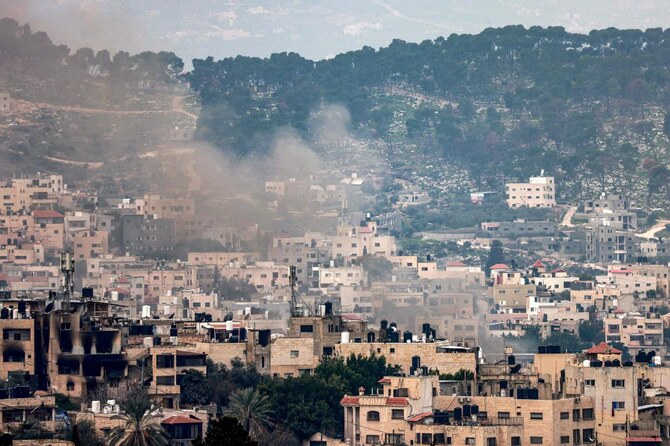JERUSALEM: Hamas on Thursday accused Benjamin Netanyahu of trying to “thwart” a Gaza truce deal, after the Israeli premier said the Palestinian militant group has “rejected everything” in negotiations.
The blame trading comes as Netanyahu faces pressure to seal a deal that would free remaining hostages, after Israeli authorities announced on Sunday the deaths of six whose bodies were recovered from a Gaza tunnel.
“We’re trying to find some area to begin the negotiations,” Netanyahu said Wednesday.
“They (Hamas) refuse to do that... (They said) there’s nothing to talk about.”
Netanyahu maintains that Israel must retain control over the Philadelphi Corridor along the Egypt-Gaza border to prevent weapons smuggling to Hamas, whose October 7 attack on Israel started the war.
Hamas is demanding a complete Israeli withdrawal from the area and on Thursday said Netanyahu’s insistence on the border zone “aims to thwart reaching an agreement.”
The Palestinian militant group says a new deal is unnecessary because they agreed months ago to a truce outlined by US President Joe Biden.
“We do not need new proposals,” the group said on Telegram.
“We warn against falling into the trap of Netanyahu and his tricks, who uses negotiations to prolong the aggression against our people,” the Hamas statement added.
US State Department spokesman Matthew Miller told reporters that Washington thinks “there are ways to address” the impasse.
At Israeli protests in several cities this week, Netanyahu’s critics have blamed him for hostages’ deaths, saying he has refused to make necessary concessions for striking a ceasefire deal.
“We are just waiting for them to come back to us, to come back alive and not in coffins,” said Anet Kidron, whose community of Kibbutz Beeri was attacked on October 7.
Netanyahu said questions remain in truce talks over the Palestinian prisoners who Israel would exchange for hostages.
Key mediator Qatar said on Tuesday that Israel’s approach was “based on an attempt to falsify facts and mislead world public opinion by repeating lies.”
Such moves “will ultimately lead to the demise of peace efforts,” Qatar’s foreign ministry said.
The October 7 attack by Hamas resulted in the deaths of 1,205 people, mostly civilians including some hostages killed in captivity, according to official Israeli figures.
Of 251 hostages seized by Palestinian militants during the attack, 97 remain in Gaza including 33 the Israeli military says are dead. Scores were released during a one-week truce in November.
Israel’s retaliatory offensive in Gaza has so far killed at least 40,861 people, according to the health ministry in the Hamas-run territory.
Most of the dead are women and children, according to the UN rights office.
While Israel presses on with its Gaza offensive, Defense Minister Yoav Gallant said the military should use its “full strength” against Palestinian militants in the occupied West Bank.
“These terrorist organizations that have various names, whether in Nur Al-Shams, Tulkarem, Faraa or Jenin, must be wiped out,” he said, referring to cities and refugee camps where an Israeli military operation is currently underway.
The Israeli military said Thursday its aircraft “conducted three targeted strikes on armed terrorists” in the Tubas area, which includes Faraa refugee camp.
A strike on a car left “five killed and (one) seriously wounded” in Tubas, the Palestinian Red Crescent Society said.
Eyewitnesses told AFP they saw a large number of Israeli troops storming Faraa camp, where explosions were heard.
Israel has killed more than 30 Palestinians across the northern West Bank since its assault started there on August 28, the territory’s health ministry says, including children and militants.
One Israeli soldier was killed in Jenin, where the majority of the Palestinian fatalities have been.
“Panic spread as the army was blowing up everything around without taking into consideration that there were children,” Hanan Natour, a resident of Jenin refugee camp, told AFP on Wednesday.
Israeli troops have destroyed infrastructure in Jenin and elsewhere in the West Bank, with the United Nations reporting the military restricting hospital access and using “war-like tactics.”
Israel’s bombardment of Gaza has left the territory in ruins, with the destruction of water and sanitation infrastructure blamed for the spread of disease.
As part of its campaign, the military has razed neighborhoods and farms to expand a so-called buffer zone between Israel and Gaza.
Amnesty International said Thursday the policy “should be investigated as war crimes of wanton destruction and of collective punishment,” an accusation the military did not comment on when contacted by AFP.
The humanitarian crisis has led to Gaza’s first polio case in 25 years, prompting a massive vaccination effort launched Sunday with localized “humanitarian pauses” in fighting.
Nearly 200,000 children in central Gaza have received a first dose, the World Health Organization said, with a second stage set to get underway Thursday in the south before medics move north.
The campaign aims to fully vaccinate more than 640,000 children, with second doses due in about four weeks.






















